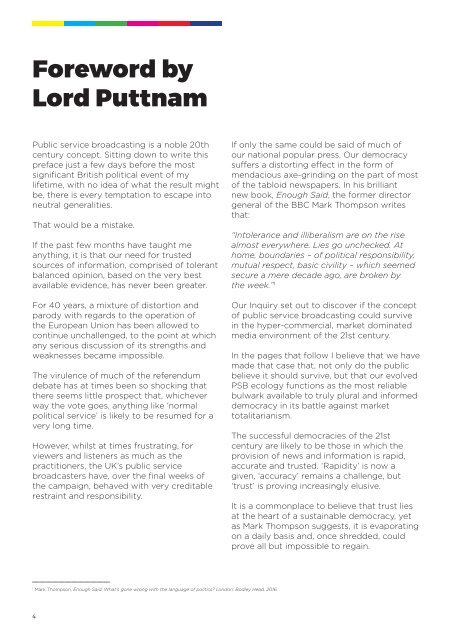A FUTURE FOR PUBLIC SERVICE TELEVISION CONTENT AND PLATFORMS IN A DIGITAL WORLD
FOTV-Report-Online-SP
FOTV-Report-Online-SP
You also want an ePaper? Increase the reach of your titles
YUMPU automatically turns print PDFs into web optimized ePapers that Google loves.
Foreword by<br />
Lord Puttnam<br />
Public service broadcasting is a noble 20th<br />
century concept. Sitting down to write this<br />
preface just a few days before the most<br />
significant British political event of my<br />
lifetime, with no idea of what the result might<br />
be, there is every temptation to escape into<br />
neutral generalities.<br />
That would be a mistake.<br />
If the past few months have taught me<br />
anything, it is that our need for trusted<br />
sources of information, comprised of tolerant<br />
balanced opinion, based on the very best<br />
available evidence, has never been greater.<br />
For 40 years, a mixture of distortion and<br />
parody with regards to the operation of<br />
the European Union has been allowed to<br />
continue unchallenged, to the point at which<br />
any serious discussion of its strengths and<br />
weaknesses became impossible.<br />
The virulence of much of the referendum<br />
debate has at times been so shocking that<br />
there seems little prospect that, whichever<br />
way the vote goes, anything like ‘normal<br />
political service’ is likely to be resumed for a<br />
very long time.<br />
However, whilst at times frustrating, for<br />
viewers and listeners as much as the<br />
practitioners, the UK’s public service<br />
broadcasters have, over the final weeks of<br />
the campaign, behaved with very creditable<br />
restraint and responsibility.<br />
If only the same could be said of much of<br />
our national popular press. Our democracy<br />
suffers a distorting effect in the form of<br />
mendacious axe-grinding on the part of most<br />
of the tabloid newspapers. In his brilliant<br />
new book, Enough Said, the former director<br />
general of the BBC Mark Thompson writes<br />
that:<br />
“Intolerance and illiberalism are on the rise<br />
almost everywhere. Lies go unchecked. At<br />
home, boundaries – of political responsibility,<br />
mutual respect, basic civility – which seemed<br />
secure a mere decade ago, are broken by<br />
the week.” 1<br />
Our Inquiry set out to discover if the concept<br />
of public service broadcasting could survive<br />
in the hyper-commercial, market dominated<br />
media environment of the 21st century.<br />
In the pages that follow I believe that we have<br />
made that case that, not only do the public<br />
believe it should survive, but that our evolved<br />
PSB ecology functions as the most reliable<br />
bulwark available to truly plural and informed<br />
democracy in its battle against market<br />
totalitarianism.<br />
The successful democracies of the 21st<br />
century are likely to be those in which the<br />
provision of news and information is rapid,<br />
accurate and trusted. ‘Rapidity’ is now a<br />
given, ‘accuracy’ remains a challenge, but<br />
‘trust’ is proving increasingly elusive.<br />
It is a commonplace to believe that trust lies<br />
at the heart of a sustainable democracy, yet<br />
as Mark Thompson suggests, it is evaporating<br />
on a daily basis and, once shredded, could<br />
prove all but impossible to regain.<br />
1<br />
Mark Thompson, Enough Said: What’s gone wrong with the language of politics? London: Bodley Head, 2016.<br />
4


